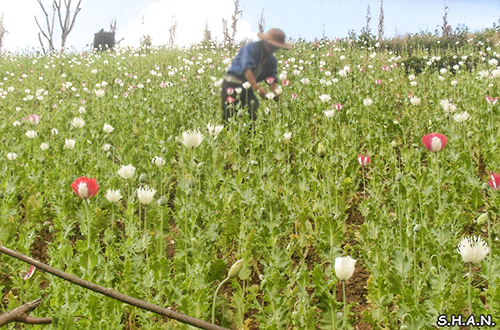The United Wa State Army (UWSA) has reportedly been destroying many acres of poppy plantations in its controlled areas in Shan State East’s Mongton township, opposite Thailand’s Chiangmai province, saying anyone who complain about its action will be placed under custody, according to local sources.
“People therefore are afraid to show their dissatisfaction against their actions,” said one of the poppy farmers from the Mongton.
The destruction campaign was launched authorities from the UWSA’s 171st Military Region since early this month following the group’s signing of a new ceasefire agreement with Naypyitaw on 6 September.

Between 2005 and 2009, poppy fields were rarely seen in the UWSA controlled areas both on the Sino –Burma border and on the Thai-Burma border, after the group declared a drug free zone on 26 June 2005. The group has also been holding drug bonfire ceremony every year since in order to reaffirm its pledge to the world given in 2005, according to the UWSA.
A local farmer recalled, “Before its relations with the Burma Army deteriorated, the group destroyed the fields by pulling the plants out including the roots.”
However opium cultivation began to increase in the group’s areas again in 2009, the year when its relations with the Burmese military turned sour over Naypyitaw’s Border Guard Force (BGF) program.
The reason for the increase was because the group did not want to add more problems with the local people while it was having a problem with the Burmese military, according to a border watcher from the Thai-Burma border.
“Now that the group’s relations with the Burmese military have returned to normal, it has begun to think more about its image,” commented the source.
The United Wa State Army (UWSA), however is still considered a terrorist organization with connections to drug trafficking by the United States and neighboring country Thailand. And its 8 top leaders including Chairman Bao Youxiang and Wei Hsuehkang have been indicted by a New York court in January 2005.
So far over a hundred acres of poppy plantations have been destroyed, said poppy farmers.
Increase of poppy cultivation in Burma is still reported each year. The UN Office on Drugs and Crime’s (UNODC) 2011 World Drug Report say that poppy plantation in Burma increased by 20 percent in 2010.
Likewise, the Shan Drug Watch 2010 report, to be published by Shan Herald Agency for News (SHAN), confirmed the number of poppy fields had increased in every part of Shan State during the 2010-2011 poppy season. They are mostly found in areas under the control of the Burma Army rather than those under control by the ceasefire armies, said the report.
The report says one of the reasons for increase in poppy plantations is because of campaign promises by candidates from the junta-backed Union Solidarity Development Party (USDP) better known as the “Lion Party”. The candidates said people who voted for their party would be allowed to cultivate poppy freely.
Another reason is local militia groups were given more authority than ceasefire groups to become involved in the drug trade as they are part of the regime’s anti-insurgency apparatus.
In southern Shan State, poppy plantations can be seen in Panglong, Loilem, Taunggyi, Hopong, Mawkmai and Panglawng townships. Some of those townships are under the control of Burma Army and some are under the control of the ceasefire-turned-militia unit Pa-O National Organization (PNO). Likewise, plantations in northern Shan State are seen in Muse, Namkham, Kutkhai, Kokang, Mantong, Namhsan and Mongmit under the control of regime-backed militia units such as Palaung State Liberation Army (PSLA), Kachin Democratic Army (KDA) and Panhsay Kyaw Myint


